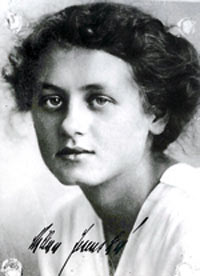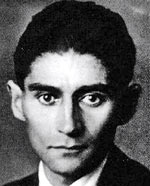Czech journalist who gave voice to the suffering of her fellow inmates

Milena
“I thank the destiny to have sent me to Ravensbrück, because there I met Milena,” wrote Margarete Buber-Neumann. Margarete, the German and Milena, the Czech exemplified a friendship between nations in the worst context possible: the Nazi concentration camp system. Both arrived in the camp in 1940 – and served there among the longest terms: Milena died there in 1944; Margarete escaped in 1945, and survived. And later testified. It took more than 30 years to Margarete to write her book as a tribute to Milena. This biography, simply titled Milena (1977), is also an illuminating sequel to her former work on Ravensbrück, As a prisoner of Stalin and Hitler, published in 1949.
Milena Jesenska (1896-1944) is widely remembered as the woman who inspired Franz Kafka in his Letters to Milena. Kafka was her passionate lover in 1920. “Love”, Kafka wrote, “is your being to me the knife with which I rummage in myself.” Franz Kafka (1883-1924) is considered, like the poet Rainer Maria Rilke, as one of the most subtle writers in German in the 20th century. Both were born and raised in Prague, Czechoslovakia – as Milena was. Kafka, a Jew, died in his early forties 20 years before Milena. Kafka did thus escape from death in the concentration camps – while Milena, who was neither a Jew nor a German but a Czech, did not.
Milena grew up in the then Austro-Hungarian Empire as the daughter of a dental surgeon. Reluctant to study, in 1918 she married Ernst Pollack, a German Jewish literary critic. They moved and lived in Vienna, Austria. She soon started working as a German-Czech literary translator. She then translated Kafka. Eventually they had a passionate affair, and a long exchange of remarkable letters. From Vienna, Milena also became a journalist for Czech magazines – an activity which she would carry on throughout her life. She divorced seven years later in 1925 and came back to Prague as a celebrity. There she married the Czech architect Jaromir Krejcar.

Franz Kafka
Her only daughter Honza was born and she published her three books during that period. But due to a serious illness she became addicted to morphine. Jaromir left her and the child. In 1931, she became a Communist militant but left the Communist Party in 1936, when Stalin’s repression against the intellectuals and the Jews began – the time Margarete Buber-Neumann, whom Milena did not know yet, was arrested by the Soviets and sent to the Russian camps in Siberia. Milena would now often write against Stalin’s repression. The political situation in central Europe was worsening. Hitler annexed Austria in the early part of 1938.
This was followed the annexation of the Sudetenland, i.e. the predominantly German speaking territories in Czechoslovakia. The following year Hitler took over the complete territory. World War II was to break out a few months later. Milena was writing as a journalist and in the meantime, as a Resistance activist had met a young German medical student, Joachim von Zedtwitz. With their underground network, they would tirelessly help the Czech Jews to illegally cross the border or they would hide British militants who had infiltrated the country. Milena was arrested by the Gestapo, the German secret police, in October 1939, and detained in the Pankrac prison.
In 1940 she was transferred to the German concentration camp at Ravensbrück. She died there on May 17, 1944, after almost four years of internment. At Ravensbrück Milena volunteered as a nurse. She shared with Margarete Buber-Neumann a true friendship. “No one can understand the violence of my feelings,” wrote Margarete, “except the one who, one day or the other, had a feeling of total loneliness in the midst of a crowd – moreover in a concentration camp.” They had first met at the ‘Wailing Wall’, the outer wall of the concentration camp along which the women prisoners were forced to silently go for a collective walk every evening.
“An intense friendship is always a great gift. If through such a gift we experiment happiness in the conditions as despairing as those of the concentration camp, that gift can become the essence of life. As long as we have been together, Milena and myself could overcome all that would have been unbearable in the present day. Such a friendship was also a protection against the degradation we were facing. The SS could prohibit anything, we remained free and untouchable.” Margarete always remembered Milena’s challenging mind, her unbroken personality, her harmony, her “spiritual energy”.
It was her way of resisting the SS of the camp, who used to “keep the women freezing in the cold, to starve them, to make them toiling hard, to shriek at them like at children, to humiliate them, even to beat them.” Moreover Milena “was displaying an impassioned interest towards the fate of the other women prisoners.” She pursued her journalistic approach in the camp: “Her way to ask questions was a sort of creating act.” “Afterwards I never met any other such person who could dominate her profession of journalist like her. Milena knew how to ask questions with a great strength and an extreme penetration. She had the skill to establish, from the first words, a personal relationship.
In any discussion she could indulge an atmosphere of proximity, because she was identifying herself to the person she was questioning.” Moreover Milena “did not show any mark of nationalistic narrowness, while jingoism was thriving among the women of so many different nations who were detained at Ravensbrück.” Milena “had understood the importance of direct testimonies”. She nurtured the project to write with Margarete after the war a book on the concentration camps – German and Russian. She could not. She died of ill-treatment and illness. Margarete did it on her behalf, as other women survivors – like Germaine Tillion, another friend of Margarete Buber-Neumann – did as a duty in memory of the many others who could not survive.


